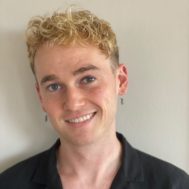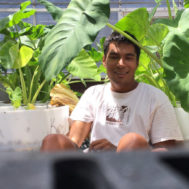+++++
November 18, 2020

By Justina Robinson, BFI Communications Assistant
This summer, the Berkeley Food Institute (BFI) supported a cohort of graduate student fellows to conduct research on the intersections of food, the climate, and health. In addition to research, the fellowship cohort participated in BFI training tailored to community-engaged, participatory research methods, building successful external partnerships, communications, policy analysis, and leadership skills.
As BFI fellows completed their program, they reflected on their experiences. Each shared sentiments on the program’s ability to alleviate the financial burdens of research during the uncertain times of COVID-19. They also appreciated the program’s ability to create a collaborative space for new research experiences and to develop more community connections.
BFI wants to give a glimpse of fellows and their experiences, highlighting all they have learned within the program. Below we have shared a variety of diverse experiences.
 “Ultimately, the BFI Summer Fellowship gave me the space and opportunity to slow down, address my anxiety over research productivity, and build my emotional resilience,” said Frances Roberts-Gregory, a PhD candidate in the Department of Environmental Science, Policy, and Management. Frances’ research focuses on how women of color in Gulf Coast Louisiana navigate contradictory relationships with energy and petrochemical industries, resist environmental racism, and devise solutions for energy, climate, and food justice. “The Fellowship allowed me the time and space to revisit my qualitative data and pay closer attention to the relationships between plants and people. It also gave me the space I needed to work independently without fear of economic insecurity.”
“Ultimately, the BFI Summer Fellowship gave me the space and opportunity to slow down, address my anxiety over research productivity, and build my emotional resilience,” said Frances Roberts-Gregory, a PhD candidate in the Department of Environmental Science, Policy, and Management. Frances’ research focuses on how women of color in Gulf Coast Louisiana navigate contradictory relationships with energy and petrochemical industries, resist environmental racism, and devise solutions for energy, climate, and food justice. “The Fellowship allowed me the time and space to revisit my qualitative data and pay closer attention to the relationships between plants and people. It also gave me the space I needed to work independently without fear of economic insecurity.”
 Alex Yong Kang Chow, a PhD candidate in the Department of Geography, reviewed his experience similarly.
Alex Yong Kang Chow, a PhD candidate in the Department of Geography, reviewed his experience similarly.
“The BFI fellowship helps alleviate my financial burden…providing support to my emotional health,” said Alex, whose research focuses on the spread of organic food, particularly in Taiwan, and its roots in social and cultural development as well as spirituality. “I would not be able to navigate my path this summer had I not be given the fellowship.”
 Jacob Spertus is a PhD candidate in the Department of Statistics who gathered statistical evidence of the efficacy of large-scale soil organic carbon sequestration on farms and rangelands and built software for analyses of real data in collaboration with soil scientists.
Jacob Spertus is a PhD candidate in the Department of Statistics who gathered statistical evidence of the efficacy of large-scale soil organic carbon sequestration on farms and rangelands and built software for analyses of real data in collaboration with soil scientists.
“BFI played a crucial role in my research this summer. The fellowship stipend gave me the financial means to work full time on the project, which I would not have been able to do otherwise,” Jacob said. “The summer provided a big leap forward for my research, because of the time I was able to dedicate via the fellowship. Without the stipend, I likely would have had to work primarily on different projects outside the food world.”
 “Prior to the fellowship, I had never conducted a social science-based research project. Therefore, with the support of BFI funds, I was able to grow as a researcher and engage with new research methods and topics. Both my interviewing skills and interpersonal communication skills improved as the summer progressed…Communicating with community members helped me to build new relationships or even stronger ones, which is incredibly important to me as I hope to be a conscious researcher that works with and for my community,” said Leslie (Leke) Hutchins, a PhD candidate in the Department of Environmental Science, Policy, and Management studying local farming in Hawai’i and related sociocultural and economic factors.
“Prior to the fellowship, I had never conducted a social science-based research project. Therefore, with the support of BFI funds, I was able to grow as a researcher and engage with new research methods and topics. Both my interviewing skills and interpersonal communication skills improved as the summer progressed…Communicating with community members helped me to build new relationships or even stronger ones, which is incredibly important to me as I hope to be a conscious researcher that works with and for my community,” said Leslie (Leke) Hutchins, a PhD candidate in the Department of Environmental Science, Policy, and Management studying local farming in Hawai’i and related sociocultural and economic factors.
The support of BFI allows for more research opportunities on the intersections of food, the climate, and health. BFI is proud of the work of our graduate student fellows and the research they have completed. We are committed to supporting graduate student fellows in the future, but we need your help to continue this program. Please make your tax-deductible donation to BFI .